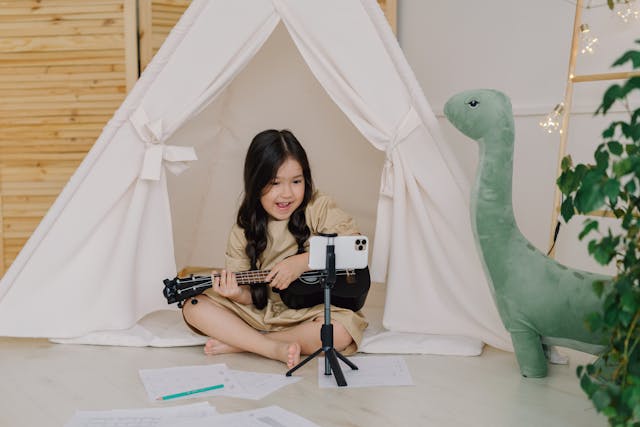Parenting often means finding creative ways to keep your children entertained and educated, especially when going outdoors isn’t an option. Indoor activities can be a valuable tool for nurturing your child’s imagination, skills, and knowledge. Let’s explore various engaging activities that will keep your little ones busy and learning, from the kitchen to the craft table and beyond.
Get on a Schedule
Stay-at-home parents can greatly benefit from following a strict schedule as it helps create structure and balance in their daily lives. By having set routines, they can efficiently manage household responsibilities, dedicate focused time for their children, and still carve out moments for personal needs or relaxation. A consistent schedule also reduces stress by providing clarity and predictability, helping parents stay organized and maintain a sense of control amid the demands of family life.
Culinary Creations
When you cook with your children, you’re doing more than just preparing food. This activity teaches them about measurements, patience, and following instructions while enhancing their sensory skills. Start with simple recipes like salads or sandwiches and gradually introduce more complex dishes. As your children grow more comfortable in the kitchen, they can help with planning meals, choosing ingredients, and even exploring cuisines from around the world.
Try Making Videos
With video becoming more and more ubiquitous all the time, teaching your children a little about video editing is a great way to encourage their creativity while preparing them for the future. You can use this free video maker to get started, then encourage your kids to draft scripts for their videos and provide constructive feedback to help them improve. From there, they can share their videos with family and friends via social media!

Journaling
Encourage your children to start journaling, which can serve as a powerful tool for self-expression and emotional health. Guide them to write about their daily experiences, feelings, and dreams. This practice not only improves their writing skills but also helps them process their emotions and articulate their thoughts. You can make this more engaging by setting creative writing prompts or having them decorate their journals, making the process both educational and deeply personal.
Developing Skills by Building
Building toys are more than just playthings; they are educational tools that enhance spatial awareness, problem-solving skills, and creativity. Whether it’s blocks, magnetic constructors, or interlocking discs, building toys encourage children to design and engineer their creations. Challenge your kids with specific building tasks or themes, and watch them learn to think critically and solve problems creatively as they play.
Learning Through Trivia
Organize trivia games that are tailored to your children’s age and interests. This can be a fun way to learn about history, science, literature, and more. Use trivia to spark discussions and further exploration into different subjects, reinforcing what they learn at school or introducing new topics. Trivia games also improve memory and recall, making learning a dynamic and interactive experience.
Drama
Creating plays with your kids is a delightful way to foster their creativity and imagination while building confidence and communication skills. This fun activity allows children to explore different characters and stories, giving them the freedom to express themselves in a safe, supportive environment. You can start by brainstorming ideas together, letting them come up with unique plots or adapting familiar stories. As you develop the play, involve them in making simple props and costumes, which can be as imaginative or as straightforward as you like.
Role-Playing
Role-playing offers your children a unique opportunity to step into the shoes of book characters or historical figures, enriching their grasp of diverse cultures and life stories. By setting up interactive scenarios, you enable them to explore complex social roles and historical events, deepening their empathy and understanding. This dynamic form of learning not only bolsters their imagination but also sharpens their critical thinking skills. Engaging in role-play can be a captivating method to teach important lessons in history and social studies, making the learning process both impactful and enjoyable.
Playing with Clay
Playing with clay offers a hands-on way for children to unleash their creativity while developing fine motor skills. Whether they’re sculpting fantasy animals, shaping imaginative monsters, or even attempting to recreate family members and pets, the possibilities are endless. The process of molding and shaping clay not only sparks imagination but also helps in understanding shapes, forms, and textures. For an added twist, introducing a simple potter’s wheel can transform the experience into a fun and educational journey into the world of pottery.
Parenting is a journey filled with challenges and opportunities to teach and learn alongside your children. By incorporating these indoor activities into your routine, you not only keep your children engaged and entertained but also contribute significantly to their development. Each activity offers unique benefits and learning opportunities, ensuring that your children’s growth and education continue even within the confines of home. These activities not only fill their days with fun but also build foundational skills that will benefit them throughout their lives.

